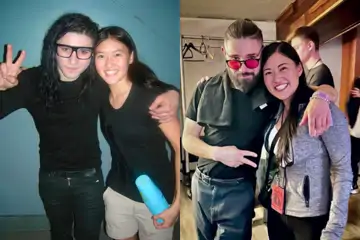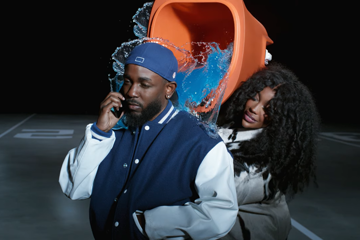The other night, out on the tiles, I heard some human use the amazing phrase 'the pre-Twitter era'. It made me laugh; hearing the 3 million years of human evolution prior to 2007 be called a single 'era'. But, it makes sense, when viewing the telescopic timelining of modern society through the prism of new-millennial solipsism; that MySpace begat Facebook as the Pliocene begat the Pleistocene; with people now able to feel aching, melancholy nostalgia for things that happened like five minutes ago. So, in that spirit, let's get nostalgic for two whole months ago, when yr old pal Film Carew explored the persistent phenomenon of the awful Sundance darling. It's timely, as ever, with the simultaneous arrival of The Sessions and Robot & Frank, a pair of crowdpleasin' Sundance winners whose pat pitch-meeting feelgoodisms will arouse the due suspicions of critical cineastes. And, sure enough, each film confirms those suspicions: each having the feeling of a meticulous button-pusher, out to plumb for moments of big drama and swelling sympathy, coldly chumming for crying crowds with both warm-hearted delivery and the inevitability of mortality. The question begs, then, is whether they do so in awful and/or unforgivable cinematic fashion.
The Sessions begins with the worst rising cinema trope of the past decade: the footage of the real person the Based On A True Story movie is based upon. But, beginning with such – rather than ending – almost qualifies as an inversion of the cliché: a cheeseball local news report talking about the subject, Mark O'Brien, and his inspirational graduation from University, which has come despite the fact that he is almost completely paralysed after a childhood affliction with polio. At first, this opening-credits clip seems like it's inviting us to mock the news report: with its old-school silver-fox/three-testicle newshound; its mid-'80s VCR wobbles; its reducing of a human being's life to a twee piece of pre-weather human-interest fluff. Except, well, then, the film kinda feels like an extension of it, all earnestness and inspiration-mongering; even if we can be thankful that the real-life face of Mark O'Brien is never set against the acting face of John Hawkes, in cheap trolling for 'wow, great casting!' reactions. That The Sessions is an earnest and inspirational movie about fucking is its wrinkle; this a grown-up portrait of sex as being a physical expression of healthy adult desires as opposed to being a biblical act of sowing and reaping (and/or a bodacious summit of adolescent achievement), which makes its central idea – especially when multiplied through the prism of disability – genuinely transgressive in certain (red) states of 'merica. The film makes literal this un/biblical dramatic device: Hawkes seeking the counsel of William H. Macy's groovy priest, who is torn between his desires to preach the rules and to be a kind of therapeutic counsel to his parishioner-as-pal. The essential message of the film is, of course, about Living Life, living deep and sucking the marrow and going out with a bang and leaving nothing on the table and nailing hot ladies even if you spend half your life in an iron lung. Director Ben Lewin – whose filmography is filled with terrible Australian movies from 20 years ago – has a personal devotion to all this, having lived through polio himself in his youth, but The Sessions doesn't feel particularly personal; it's too broad and non-specific. Instead, it's a crowdpleasing concoction of semi-witty one-liners and a parade of premature ejaculations that are supposed to be hilarious every time; and, by the end, it becomes almost ruthless in its pursuit of weepiedom, clubbing you over the head with the profundity of connecting with other people – and maybe fucking them, too – before you're just dead and buried.
Robot & Frank is set (cue: macho trailer-voice-over-dude-voice) in The Not Too Distant Future, in a world in which commercially-available robot helpers tend to the elderly and infirm; a once-wild fantasy of moon-colony Jetsonia now just a Big Box purchase away. But Frank Langella's cantankerous old coot isn't copacetic with such clinking, clattering cacophanies of colligenous cogs and camshafts; eyeing the robo-helper gifted by his dickwadish son (James Marsden, well cast for his natural 'waddery) with a look of permanent suspicion. But, in the world of crowdpleasery, even old dogs can learn new tricks, and soon enough we're in sentimental buddy-movie territory, as Robot & Frank (the title is literal) are crackin' wise about each other's mamas and planning cat burglaries in the face of a world that sees robots and old people as essentially useless. The film pads along in a fashion that seeks only a few minor laughs, until, oh, wait, shit, it's about alzheimer's and the fallibility of the human brain and fucking dying already. Debutante director Jake Schreier and screenwriter Christopher D. Ford play with this memory motif: a local library is digitising entire catalog and then losing the hard copies of actual books; the robot has a memory-wipe function that Frank can't bring himself to engage, even when a local cop (Jeremy Sisto!) is closing in; and the protagonist's deteriorating mental state is used as narrative catalyst for unexpected edits and, of course, sentimental revelations. It teeters on the precipice of mawkishness, yet walks the line well; and its quiet, domestic depiction of incipient technology stands sweetly at odds with endless tracts of dystopian fearmongering re: robots.

God Bless America has none of the mawkish mediocrity of the Sundance Audience favourite; instead, it's provocative and obnoxious, both a delicious anti-idiot fantasy brought to life and a critique thereof. In short: Joel Murray (either Bill's brother or Freddy Rumsen, your pick) and (surviving child actor) Tara Lynne Barr are a cross-generational Bonnie & Clyde, going cross-country on a killing spree that will speak to anyone dismayed with the idiocy of the day: gunning down reality-TV 'stars' and neo-con talking-heads and Westboro-esque hate-preachers and the rude and oblivious and so forth. It's rollicking fun until it isn't: writer/director Bobcat Goldthwait –whose previous pictures, Sleeping Dogs Lie and World's Greatest Dad, both had similar spirit of genuine transgression – deliberately taking things too far, rubbing the audience's noses in their desire for cinematic bloodlust. Amidst the reality TV satire and sardonic, smirking comedy, it's not hard to notice that the film is about tackling an All-American problem with an All-American solution; whereby if someone's bothering you, be they classmates at school or Afghani infidels, the best thing to do is to get yourself a semi-automatic weapon. As the corpses pile up, God Bless America goes from funny-ha-ha to kinda horrid; Goldthwait, perhaps, just suggesting that America is a country rotten to the core, and no avenging saviour or exterminating angel could ever right its manifold wrongs.
Don't miss a beat with our FREE daily newsletter
Seven Psychopaths is the most meta- of meta-movies; with Irish playwright Martin McDonagh following his beloved, cult-movie debut, In Bruges, with an Adaptation.-esque lark of screenwriting shitkicking. Colin Farrell plays Marty, an Irish writer living lazy in Los Angeles, theoretically scribbling a screenplay called Seven Psychopaths, yet mostly just getting so drunk he blacks out (McDonagh is happy for his proxy to be humiliated, constantly). He's got a dipshit best friend, Sam Rockwell, who may or may not be a serial killer systematically slaying organised-crime goons; but who definitely kidnaps dogs for Christopher Walken, and who definitely steals the dog of hysterically-violent mafioso type Woody Harrelson. From there, a chain-of-events unfolds with familiar crime-movie moves: all back-and-forth retributions, killing begetting killing, blood splattered from hither-to-yon. But McDonagh plays with every crime-movie cliché he uncorks. As Farrell and Rockwell and Walken spitball ideas for a screenplay, those ideas take over the film; the stories within and the actual story dancing to-and-fro, so that the 'reality' of the piece is eternally confused. As it comes to a close, the film you are watching has become the film that's been written therein, making for a mad piece of meta-movie monkeyshines that comes with the obligatory patter of wise-ass one-liners that you expect from McDonagh. It's a fun ride – with Walken, Harrelson, and Tom Waits all relishing the opportunity to play roles hugely comic and quietly sinister – that occasionally seems inspired, but there's a limit to Seven Psychopaths' charms; the elegantly-structured screenplay, unexpected emotional pull, and restrained cinematic command of In Bruges feeling like so long ago; this 'difficult follow-up' a mish-mash of mocking, over-the-top bombast that sometimes veers closer to sketch-comedy than satire; with even its self-critique (wherein it ridicules its own devotion to a clichéd genre, implausibility, idiocy, and borderline misogyny) painted in shades bright and lurid. Its ending suggests that the film is McDonagh's nightmare of the life of a writer in Hollywood made manifest, but no one's about to mistake this for Barton Fink. Nor, really, Adaptation., even if Charlie Kaufman's worst movie is the comparison that makes the most sense.

Paul Kelly: Stories Of Me is the obligatory documentary on the bard of post-punk Melbourne, on his enduring career and persistent legacy. We get the usual: gushing talking-heads tributes, a constant parade of past hits, formative childhood tales illustrated with old family photos. There's a pleasingly freewheeling feeling to the edit, which ignores a linear biographical telling to, instead, alight on tangents; pulling from the past and illustrating ideas with their subsequent songs. Like most films of this ilk, the tunes are memorable, but the movie forgettable; there no great narrative or theme that arises beyond the flattery of its subject. Renée Geyer may say memorably, herein, “a saint he ain't” in description of Kelly, but Stories Of Me is a definite hagiography.
An idealistic young Spanish woman (Verónica Echegui, looking and acting like a B-grade Penélope Cruz) heads to Nepal to become a teacher; and, of course, to change the world. And, from that very premise, Kathmandu Lullaby (whose title translates, with far more lyricism, as Kathmandu, A Mirror In The Sky) is on a slippery ideological slope; forever flirting with the very real danger of becoming one of those noxious White Knight moves, where a virtuous defender blessed with a sense of righteous justness and pale skin, ventures into the third world to fix all the problems that those hopeless darkies just can't fix themselves. Disinterested principals, crooked immigration officials, superstitious villagers, doubting thomases, husbands-of-convenience, Nepalese society: they're all in Echegui's crosshairs, as she yells and hollers and stomps her feet (seriously, there's a scene where she screams at the heavens in a downpour after someone has died); doing all but wailing 'won't somebody please think of the children?' as she enacts her Inspirational Crusade to help the kids of the mountains, to teach them well and let them lead the way. Icíar Bollaín's previous picture, Even The Rain, was another film about mobilising locals on exotic, mountainous foreign shores, but it carried a different ideological crusade; its Paul Laverty-penned screenplay set against the Coachabamba Water Wars, in which indigenous Bolivians overthrew a multinational's plans to bottle their water supply. In some ways, its existence stood in defiance of the White Knight movie; which makes Kathmandu Lullaby's muddled morality and telemovie mediocrity doubly disappointing.
Speaking of Laverty: his latest collaboration with Ken Loach, The Angels' Share, arrives on screens this week. After his amazing back-to-back of Ae Fond Kiss... and The Wind That Shakes The Barley in the mid-'00s, Red Ken's been in so-so cinematic form since; the social thrust of pictures like It's A Free World... (which chronicled itinerate and illegal workers) and Route Irish (a thriller about private security contractors and military cover-ups in Iraq) not translating to on-screen transcendence. But Loach is nothing if not a hard worker, and so he keeps on: The Angels' Share reminiscent of Loach larks like Looking For Eric and his third of the Tickets omnibus; in which the requisite harsh socio-realism gives rise to something that plays more like a fairytale; a light of hope shining into the dank lives of those dwelling amongst the Glasgow housing estates. Laverty starts with a winning device: a day in court for a tired judge, who shakes his head at the petty misdemeanours, regrettable judgment, recidivist behaviours, antisocial angst, and violent actions of those who come before them. Only, we then pull away from the courtroom and meet the same perps over again, this time as lovable scamps performing community service together. The threats of relapse and retribution are always there – the low-rent life, like the mafia, something forever pulling them back in – but there's a warm-hearted quality to the picture that lets you know it's heading somewhere slightly-less-bleak. Here, it comes via the kindly heart of John Henshaw, and the sensitive nose of (screen debutante) Paul Brannigan. Both lead our rag-tag gang (which features Loach regular William Ruane) into the slightly high-falutin' world of whisky distillery, which offers a slim possibility of a Way Out. From there, things movie towards a kind of low-key caper comedy tinged with terrifying bouts of street-thuggery and threat-levelling; Loach handling the mix of the two ably, if not memorably.















